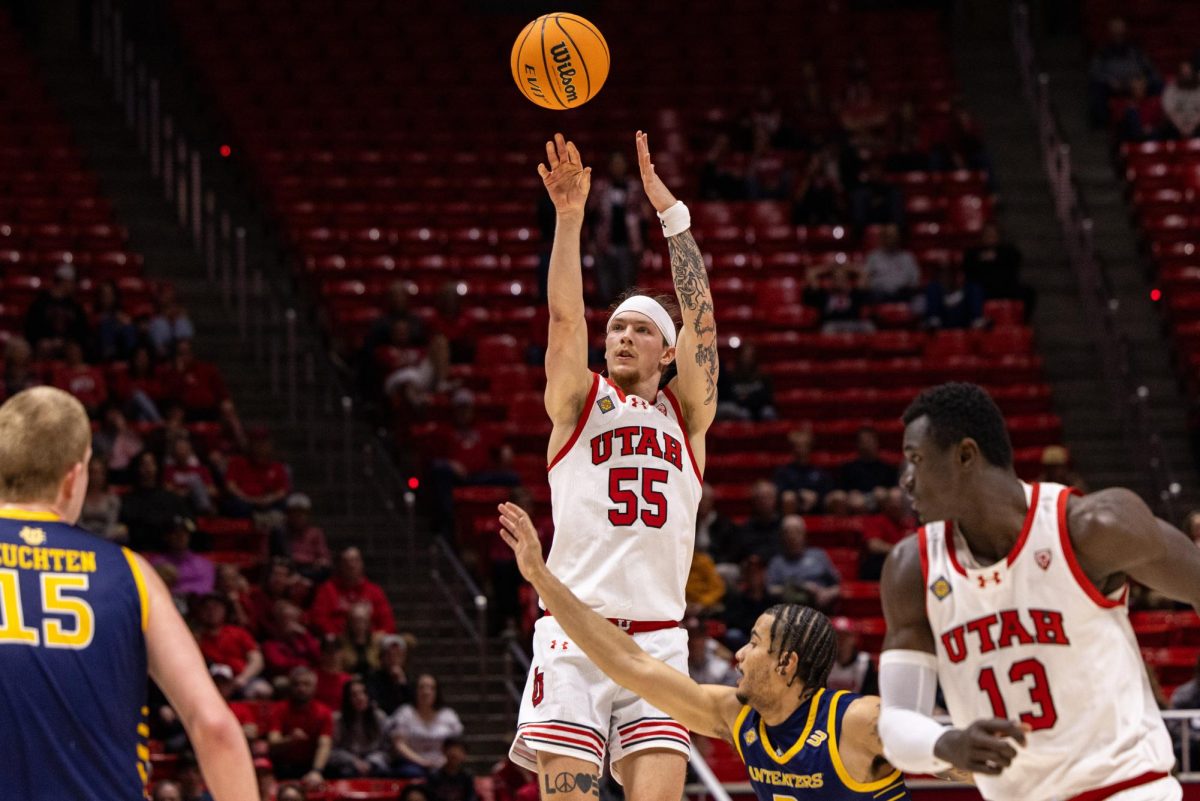Cushman: It’s Up to Us to Combat News Monopolization
(Graphic by Claire Peterson | The Daily Utah Chronicle)
April 13, 2023
On Last Week Tonight in 2017, John Oliver described the Sinclair Broadcast Group as “the most influential media company you’ve never heard of.” That’s because they operate television stations that reach about 40% of the country. They’ve reached this level of viewership by buying out local news stations. Alden Global Capital, a hedge fund, similarly expands their influence by buying out America’s local newspapers.
Consolidation of local news outlets by bigger, national companies harms local news, something Utah isn’t immune to. In fact, three of Utah’s major local stations, KUTV, KJZZ and KMYU, are owned by Sinclair. With this in mind, Utahns need to adapt the way we engage with the news to recognize flawed coverage and support local journalism.
The Fourth Branch of Government
Freedom of the press is embedded into our Bill of Rights. The media has become so integral to American democracy that it is sometimes referred to as the fourth branch of government. The news empowers citizens to check the government by informing them about legislation, corruption and candidate information.
The news serves an especially important purpose at the local level. Local journalism is the only kind of news that has the capacity to cover issues in small and mid-sized communities. Take The Salt Lake Tribune: their coverage of abuse in teen treatment facilities uncovered hidden secrets behind one of Utah’s big industries.
The service local journalists provide to our state becomes obvious during the early part of each year, during our 45-day legislative session. Over that month and a half, hundreds of bills are voted on. It falls to local journalists to cover those bills and hold our legislators accountable for the work they would otherwise do in the shadows.
Local news outlets also build community by bringing us together around issues like housing development and community safety. Additionally, they contextualize national political issues, like anti-trans legislation or gun violence, at the local level.
Local journalism plays a very important role in civic life. Research shows the disappearance of a local newspaper correlates with “lower voter turnout, increased polarization [and] a general erosion of civic engagement” in the community it served.
The Destructive Force of News Consolidation
Due to its role in our democracy, constituents have a vested interest in what happens to local news when it gets bought by Sinclair or other big media conglomerates. Unfortunately, it seems that when a conglomerate takes over a local news station, the effects are anything but positive.
In 2018, Sinclair became a national headline when they forced nearly 200 of their anchors, including in Utah, to read a script about fake news during a time the press was already under attack by Donald Trump. This created concern that Sinclair pushes their local outlets to frame the news from a right-wing perspective. Employees at Utah’s KUTV even felt uncomfortable with segments they’ve been forced to make by Sinclair, including the fake news one.
For a more extreme example, let’s examine the daily terrorism segment some Sinclair-owned stations are forced to make. When there aren’t any major news stories about terrorism, stations have to fill that slot with something, which resulted in a story about a burkini ban. A story, not about terrorism but about Muslims, when given the label of terrorism reinforces Islamaphobic ideas.
When media conglomerates take over local news though, constituents shouldn’t only be concerned with biased coverage. Perhaps more importantly, unique news stories and locally focused ones seem to take a backseat to the segments on fake news or terrorism that Sinclair pushes their hosts to air.
Research shows that after Sinclair takes over a station, their websites post less content and their local coverage declines. When Alden Global Capital takes over a newspaper, the same thing occurs. Newsrooms get gutted, resources depleted, journalists are overwhelmed and local news suffers. In this way, news consolidation causes considerable harm to communities it affects.
Responsible Consumption in an Unprecedented News-Scape
At the individual level, standing up to a big corporation or hedge fund feels like an insurmountable task. We can’t stop them from buying out local news organizations or scripting what our trusted anchors say. But we can change the way we engage with conglomerate news and give our support to independent local news sources.
By knowing which stations are owned by conglomerates influencing their coverage, we can take extra time to see how other outlets cover the same stories. We can also seek out sources that emphasize local issues to stay informed about our community. Those sources can include The Salt Lake Tribune, The Daily Utah Chronicle, the Twitter accounts of Utah-based journalists or podcasts about Utah politics. Switching the TV on to a local news station is easy, but no easier than listening to the Hinckley Report podcast during your morning commute.
Perhaps most importantly though, we can support independent local journalism. Paying for subscriptions to outlets like The Salt Lake Tribune can make a huge difference in keeping our news independent.
In the last four years writing for the Chronicle, I’ve covered bills during the legislative session that I haven’t seen any other coverage on. I’ve covered important campus issues that don’t get opinion coverage in bigger papers. It has given me a unique appreciation for the role local journalism plays in making our local politics something for everyone who lives here. Local journalists across the nation and in our state face unprecedented challenges. Our civic duty compels us to responsibly consume the news and support local outlets.









